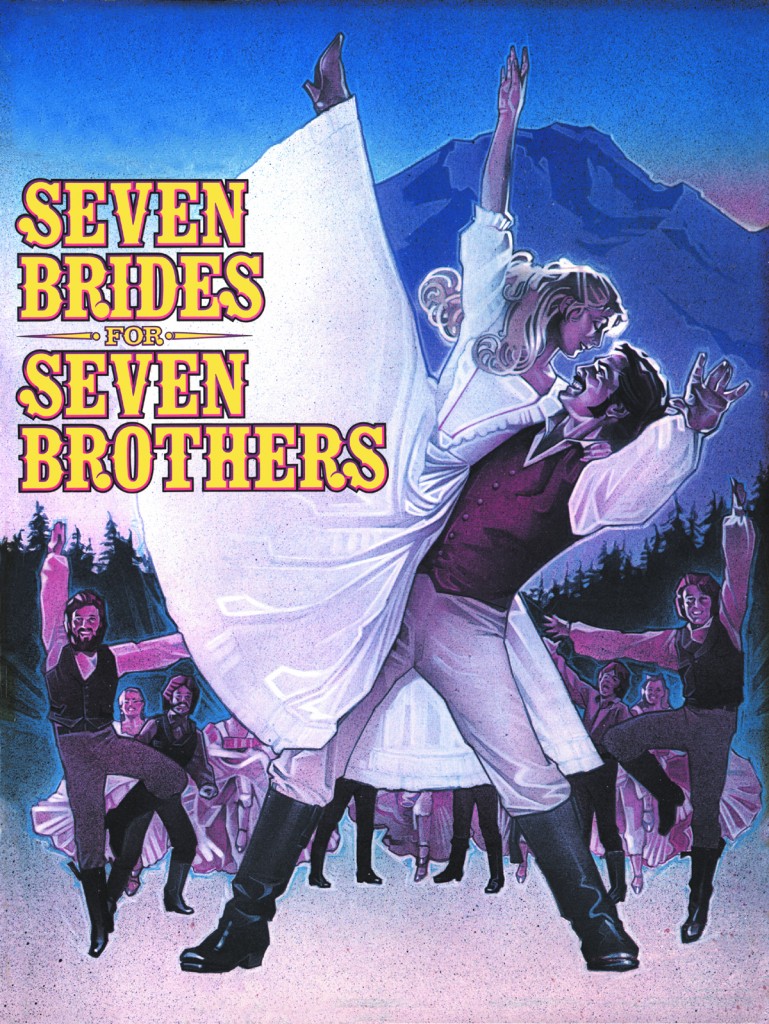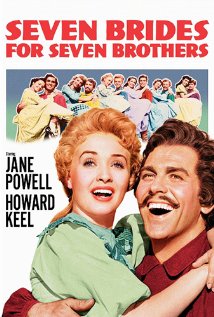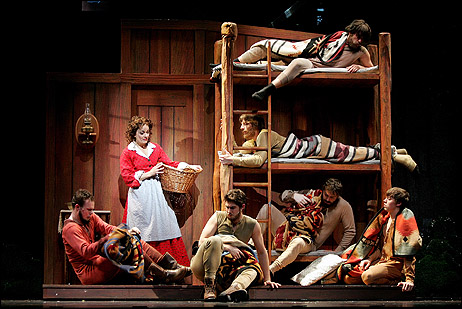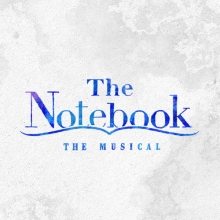Filichia Features: Seven Brides, Seven Brothers, Seventh Recording

Filichia Features: Seven Brides, Seven Brothers, Seventh Recording

Seven Brides for Seven Brothers is experiencing its lucky seventh.
Until this year, there had been six recordings on which Gene de Paul’s music and Johnny Mercer’s lyrics have been featured. The first, of course, was the original soundtrack album of the 1954 film that had been the ninth-highest grosser that year.
Howard Keel was Adam Pontipee, an Oregonian woodsman who was in the market for a wife; Jane Powell portrayed Milly, whom screenwriters Albert Hackett, Frances Goodrich and Dorothy Kingsley apparently took for granted as much as Adam; they didn’t even deign to give her a last name.
Probably few moviegoers noticed because they were too busy enjoying the Mercer-de Paul score. Adam’s “Bless Your Beautiful Hide” has a nice, Western-tinged loping melody; Milly’s “Wonderful, Wonderful Day” is a swirling waltz that perfectly extols the joys of love in a quintessential show song of the pre-rock era; the Brothers’ “Sobbin’ Woman” -- a nice play on the Sabine Women on which this story is loosely based – is a production number in the great Broadway tradition.
No wonder that twelve years later, a British label called “Music for Pleasure” made a second Seven Brides recording. No one accused the company of false advertising, for the Mercer-de Paul score had long been established as music for pleasure.
We expected an original Broadway cast album when Seven Brides arrived at the Alvin Theatre on July 8, 1982. After all, the score wasn’t business as usual; Al Kasha and Joel Hirschhorn had written many new songs for the spots the movie had missed.
“The idea of putting the film on stage had occurred much earlier to my brother,” says Kasha, referring to Lawrence Kasha, who would work on Broadway musicals as a stage manager (Silk Stockings, Li’l Abner, How To Succeed), co-producer (She Loves Me, Inner City, Woman of the Year) director (an associate on Funny Girl and fully in charge of Bajour). “When he and I saw it first-run as kids in Brooklyn, he was already saying it should be a Broadway show. He had already heard what Oscar Hammerstein had said – that all great musicals have two worlds colliding. Here we had a mountain man meeting a city girl. Adam has to be tamed down, and Milly does just that.”
A quarter century would pass before Lawrence Kasha would put the idea into motion. “While he was producing television in Hollywood,” says Kasha, “he called me and said ‘Let’s do Seven Brides with you and Joel doing some new songs. He wasn’t above adding “And I know you won’t cost me much.’”
Actually, they deserved a pretty penny. There aren’t many songwriting teams that can boast of having won two Oscars, but the Kasha-Hirschhorn alliance did. The first came in 1973 for their theme for The Poseidon Adventure: “The Morning After” which also went to Number One on the charts. A mere two years later, they won for “We May Never Love Like This Again” from The Towering Inferno.
So the songwriters literally got together: “We always worked in the same room at the same time and wrote both music and lyrics together,” says Kasha, referring to his collaborator who died in 2005. “One of the first things we did was replace ‘When You’re in Love.’”

Well, it does have the feel of operetta, and there hadn’t been a truly successful operetta since the Roosevelt Administration (granted the second Roosevelt Administration, but we’re still talking many years earlier).
“So we wrote ‘One Man’ for Milly,” Kasha says. “It’s a song of protest that even has a little women’s lib in it.”
Why shouldn’t it? Look what happened to Milly – a fate not unlike the one Nellie Forbush endured in South Pacific. In both shows, a man asks a woman to be his wife without letting her know that there will be other bodies for whom she’ll have to care. Nellie will automatically become the stepmother to Emile’s two children – not that he had the courtesy to tell her, no more than Adam in Seven Brides informed Milly that she’ll be tending to one husband and his six brothers.
The difference – and it’s a profound one – is that Nellie doesn’t take issue that she wasn’t warned in advance; Milly understandably resents it. “But,” says Kasha, “she does come to the conclusion by the end of the song that she’s with the right guy.”
Is she? Not much time passes in the film before Milly happens to overhear a conversation between Adam and his brother Gideon, who has a raging case of puppy love. “Every girl’s the same,” Adam says dully. “One girl’s pretty much like the other.” Milly stays silent in the film, but the new songwriters gave voice to both her and the guys – “in three-part harmony,” Kasha says with pride.
Adam later reinforces his position with another Kasha-Hirschhorn addition “A Woman Ought to Know Her Place.” Says Kasha, “Despite the title, he is questioning himself. And he does get his wake-up call when he finds that he’s become a father and sees Milly singing to their newborn ‘Glad That You Were Born.’
The other addition was the rousing “We Gotta Make It through the Winter,” first sung by the brothers, whom Milly insists stay away from the ladies until the avalanche melts in spring; it’s reprised by Milly and the women, too. Alas, Seven Brides For Seven Brothers’ 1982 Broadway production didn’t remotely make it through the winter, or even the fall. It opened on Thursday, July 8 and closed on Sunday, July 11.
Unfortunately Frank Rich, then the all-powerful theater critic for the New York Times, stated in his review that didn’t even like the originated (Oscar-nominated, mind you) film; he called it “less than thrilling.” When a critic spends his first paragraph on the actors’ hair color and the second on the set, you know you won’t be reading a rave. Indeed Rich’s review wasn’t, and the marriages between the 14 principals were quickly annulled. In those days, few five-performance flops got recorded, and Seven Brides was one of casualties. The Kasha-Hirschhorn team had to be assuaged the following spring when the Tony committee handed them (as well as Mercer and de Paul) a nomination for Best Score.
And the best was indeed yet to come – in England. Granted, the original London production in 1985 didn’t do much better – 41 performances – but it did get a recording (Seven Brides’ third, if you’re keeping score with us). Nothing helps spur additional productions than a recording, and the disc helped Seven Brides to be revived in 1986, receive another British recording in 1994 (that’s four), a new production in 1999, another British recording in 1997 (we’re up to five now) and yet another production in 2006.
When I bring up to Kasha that a poll of British theatergoers’ all-time favorite stage musicals had Seven Brides in fourth place, he in turn tells me of another poll that ranked it second only to LES MISERABLES. “That’s one reason,” he says, “you might very well see another major West End production next year, possibly at the Savoy Theatre.”

Luke Longacre, Michelle Dawson, Eric Sciotto, Karl Warden, Travis Kelley, Randy Bobish and Christian Del Croix in Seven Brides for Seven Brothers. (Photo © Bruce Bennett)
The sixth recording? The 1998 Italian cast album of Sette Spose per Sette Fratelli. And now comes the best of them all, courtesy of a production that happened this past summer. The musical that is mostly set in the great outdoors finally got to play outdoors in Regent’s Park Open Air Theatre in – where else? – London.
The London recording is bright and lush, thanks to fine performances by Alex Gaumond (Adam), Laura Pitt-Pulford (Milly) and a sumptuous orchestra. I daresay that someone with no prior knowledge of the show wouldn’t be able to tell where Mercer and de Paul left off and Kasha and Hirschhorn began.
“Yes,” says Kasha. “A very different New York Times critic saw the production at Paper Mill Playhouse (in New Jersey in 2007) and said the new songs fit in seamlessly with the old ones.”
There’s one funny thing about the property. Given that its title is Seven Brides For Seven Brothers, we know that no matter what avalanches and other barriers that the girls and guys encounter they’ll wind up married. As Sondheim once wrote, “A happy ending, of course.” That’s also true of what Al Kasha and Joel Hirschhorn eventually experienced with Seven Brides For Seven Brothers.
You may e-mail Peter at pfilichia@aol.com. Check out his weekly column each Monday at www.broadwayselect.com, Tuesday at www.masterworksbroadway.com and Friday at www.kritzerland.com. His book The Great Parade: Broadway’s Astonishing, Never-To-Be Forgotten 1963-1964 Season is now available at www.amazon.com

























